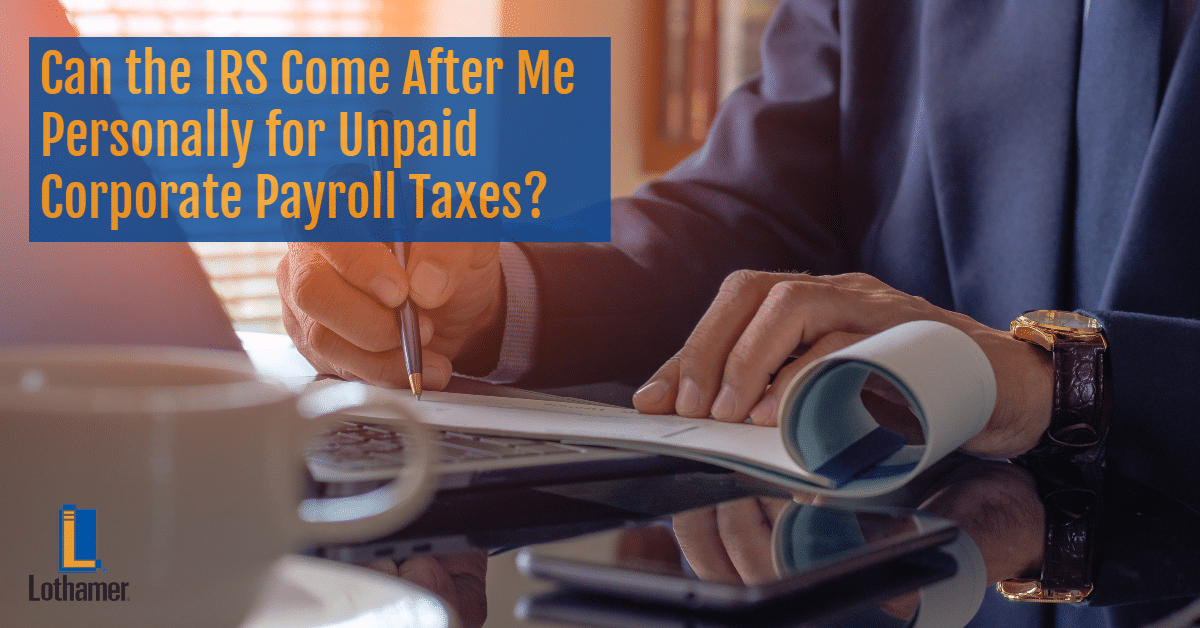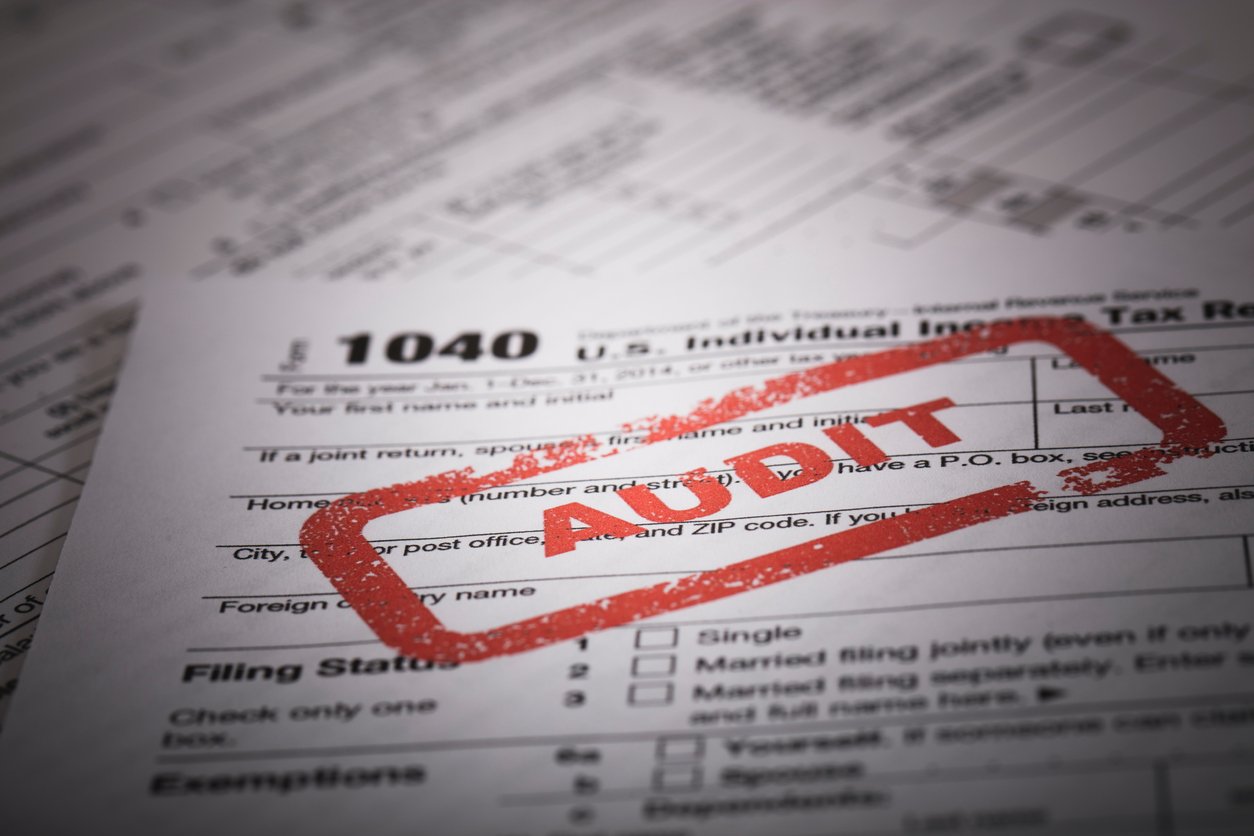
Owning and running a business can be one of the most rewarding endeavors you’ll ever embark on. However, it’s also fraught with pitfalls, especially when managing employee paychecks and paying payroll taxes. When you have suppliers to pay and operations to keep running, it’s all too common to find yourself with unpaid payroll taxes.
As licensed tax professionals, we often hear one question from our clients: whether the IRS can come after them personally for these tax debts. The short answer is yes, they can. But the real answer is more complex than that. Look at your liabilities and what to do if you’re a business owner with a tax debt or delinquent payroll taxes.
What Are Corporate Payroll Taxes?
First, let’s define what we mean by unpaid corporate payroll taxes. These taxes are withheld from employees’ wages, such as federal income tax and Federal Insurance Contributions Act (FICA) taxes, including Social Security and Medicare taxes. As the employer, you are responsible for withholding and depositing these taxes with the IRS on your employees’ behalf.
If your business fails to pay back taxes or file the appropriate tax returns, the IRS can take action to collect the unpaid taxes. This can include harsh financial penalties, high interest, and even criminal charges in some cases.
Can The IRS Come After The Business Owner Or Other Officers Of The Company Personally For Unpaid Federal Income Taxes?
The answer is yes, under certain circumstances. The IRS is extremely aggressive about collecting and using income tax withholding and penalizing business owners for unpaid payroll taxes—more so than any other tax type. Late penalties on employee payroll taxes rack up fast, and even two quarters of dealing with these growing penalties can be enough to put a company out of business.
The way your business is structured may have some bearing on your ultimate tax rate and liability:
- Sole proprietorships: You are solely responsible for any and all employer and employee taxes, and the federal government can come after you personally
- Partnerships: Partners may either split responsibility or, in limited partnerships, one partner takes on the risk while the other is generally protected from personal liability
- Corporations: Your personal assets are generally protected
However, no matter how your business is structured, anyone who knowingly or willingly fails to pay payroll taxes can be held personally responsible. Let’s take a closer look.
What Are The IRS Penalties For Employer Payroll Taxes?
The IRS can use a legal concept called the trust fund recovery penalty (TFRP) to hold individuals personally responsible for unpaid payroll taxes. That’s because, technically, as the employer, you are holding the money in federal unemployment tax your employees must pay in trust.
Under the TFRP, the IRS can assess a penalty equal to 100% of the unpaid taxes, plus interest and fees. This penalty can be levied against anyone responsible for collecting, accounting for, or paying over federal payroll taxes. This can include:
- The business owner
- Officers of the company
- Members or employees of a partnership
- Directors and shareholders
- Accountants
- Any other professionals who were involved in the payroll process
Who Is Responsible For Unpaid Payroll Taxes?
So, how does the IRS determine who is a responsible person? You could be held responsible for state income tax if it is determined that you had the authority to pay the necessary taxes and willfully failed to do so.
To qualify as a willful evasion, a person must generally:
- Be aware that taxes are due
- Actively decide not to pay the taxes, whether or not their motive was to break the law.
This frequently happens when cash flow is tight, and an employee pays off suppliers, contractors, or other vendors instead of paying the business taxes owed. This gamble often lands businesses in hot water—a major mistake with consequences.
If the IRS determines that a person had the authority and willfully evaded paying, they can assess the TFRP against that person. The TFRP is not dischargeable in bankruptcy and can result in significant financial consequences, including asset seizures, deposit taxes, and wage garnishments.
What To Do If You’re Behind On Payroll Taxes
Delinquent employment taxes are highly penalized and aggressively pursued, so it’s critical to take immediate action if you are a state unemployment tax or a business owner struggling to keep up with deposits.
If you’re an officer of the company, ensure you understand your responsibilities regarding withholding and depositing payroll taxes on time. This includes federal income tax, other taxes paid, Social Security tax, and Medicare tax. Don’t assume that someone else is taking care of it.
If your company struggles to make payroll tax deposits, a CPA or tax attorney acting as an Enrolled Agent can help you proactively speak to the IRS to discuss payment arrangements or other options. And if you receive a notice from the IRS regarding unpaid payroll taxes, don’t ignore it. Contact a tax professional or attorney immediately to help you navigate the process.
Contact A Federal Income Tax or Payroll Tax Resolution Expert
The IRS can come after individuals personally for unpaid back corporate taxes and payroll taxes under certain circumstances. The TFRP can and has been used to serve major financial blows to business owners and other responsible parties. The longer you wait, the more penalties and interest will accrue, and the more difficult it will be to resolve the situation.
Getting current on your taxes and planning to stay current is critical to avoid being held personally responsible for unpaid payroll taxes. The professionals at Lothamer Tax Resolution have helped countless small business owners throughout the Midwest tackle the toughest tax problems. If you have been found responsible for a TFRP or know you owe unpaid payroll taxes, put a professional on your side TODAY and settle your tax problem once and for all!
Get Help Solving Payroll Tax Problems In Michigan, Illinois, Indiana, Or Wisconsin
Lothamer Tax Resolution has been helping the Midwest’s business owners navigate IRS and state tax issues since 1978. We offer same-day tax help, deeply qualified tax professionals, and advanced technologies to help you stay informed and plan your tax return with an optimal Roadmap to Resolution. Find your nearest location here or text or call (877) 955-9020 to speak with a tax professional today!
"*" indicates required fields




